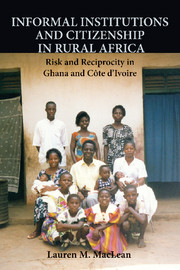 Informal Institutions and Citizenship in Rural Africa
Informal Institutions and Citizenship in Rural Africa Published online by Cambridge University Press: 05 May 2010
ENTRY INTO THE FOUR AFRICAN VILLAGES
For the first five to six hours of the journey from the capital cities of Ghana (Accra) and Côte d'Ivoire (Abidjan) to the fieldsite villages in the Brong-Ahafo and Abengourou regions, I traveled in relative comfort in a large, Greyhound-style bus. Once we arrived at the district or regional capital, my two research assistants and I were told to “wait small” to fill up a compact-size taxi (usually squeezed with four in the back and three up front). As we clattered down the pitted dirt road for the last half hour of our trip, I noticed the extra bolts and duct tape that kept various parts of the car secure and glimpsed the ground below through several small holes in the floorboard. I supposed it was in the interest of fuel economy that the engine was turned off, and we coasted down a couple of the hills on our way. None of these things seemed interesting, or even noteworthy, to my research assistants as they quietly scanned the horizon for signs that we may have entered our first fieldsite.
Of course, this “official arrival” beginning in October 1998 was not the first time I had visited each of these fieldsite villages. On a scoping trip a year earlier (during the spring and summer of 1997), I had followed the chain of command from the capital cities of the nation, region, and district to gather information about the differences among the various regions, districts, and villages; and to obtain official permission to visit and perhaps later conduct my study.
To save this book to your Kindle, first ensure [email protected] is added to your Approved Personal Document E-mail List under your Personal Document Settings on the Manage Your Content and Devices page of your Amazon account. Then enter the ‘name’ part of your Kindle email address below. Find out more about saving to your Kindle.
Note you can select to save to either the @free.kindle.com or @kindle.com variations. ‘@free.kindle.com’ emails are free but can only be saved to your device when it is connected to wi-fi. ‘@kindle.com’ emails can be delivered even when you are not connected to wi-fi, but note that service fees apply.
Find out more about the Kindle Personal Document Service.
To save content items to your account, please confirm that you agree to abide by our usage policies. If this is the first time you use this feature, you will be asked to authorise Cambridge Core to connect with your account. Find out more about saving content to Dropbox.
To save content items to your account, please confirm that you agree to abide by our usage policies. If this is the first time you use this feature, you will be asked to authorise Cambridge Core to connect with your account. Find out more about saving content to Google Drive.